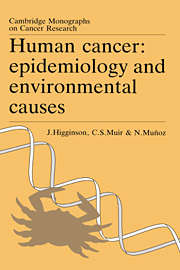Book contents
- Frontmatter
- Contents
- Contributors
- Preface
- Acknowledgements
- Historical introduction
- PART I Epidemiological methods
- PART II Causative factors in human cancer
- PART III Legal and ethical considerations
- PART IV Introduction: total and specific site epidemiology
- PART V Buccal cavity
- PART VI Digestive system
- PART VII Respiratory system
- PART VIII Bone and soft tissue
- PART IX Skin
- PART X Breast and genitourinary system
- PART XI Eye and nervous system
- PART XII Thyroid and other endocrine glands, lymphoid and hematopoietic system
- PART XIII Cancers in children and multiple primary cancers
- Conclusions
- Appendix 1 Cancer statistics
- Appendix 2 A glossary of epidemiological terms
- Appendix 3 Acronyms and abbreviations
- Supplement
- Index
Preface
Published online by Cambridge University Press: 03 May 2010
- Frontmatter
- Contents
- Contributors
- Preface
- Acknowledgements
- Historical introduction
- PART I Epidemiological methods
- PART II Causative factors in human cancer
- PART III Legal and ethical considerations
- PART IV Introduction: total and specific site epidemiology
- PART V Buccal cavity
- PART VI Digestive system
- PART VII Respiratory system
- PART VIII Bone and soft tissue
- PART IX Skin
- PART X Breast and genitourinary system
- PART XI Eye and nervous system
- PART XII Thyroid and other endocrine glands, lymphoid and hematopoietic system
- PART XIII Cancers in children and multiple primary cancers
- Conclusions
- Appendix 1 Cancer statistics
- Appendix 2 A glossary of epidemiological terms
- Appendix 3 Acronyms and abbreviations
- Supplement
- Index
Summary
This monograph attempts to summarize the epidemiology of human cancer, including not only its geographical distribution in various environments and ethnic groups, but also known or suspected causes. The aim is to make available a compact source of data and a summary consensus of current views on etiology and thus provide a background, not only for evaluating cancer control and preventive policies, but also for developing strategies for research into the causes of specific tumors. The authors wish to emphasize that epidemiology remains the only discipline which can provide definitive data as to the existence, extent and nature of cancer risks in humans and the impact of preventive and intervention strategies. The term environmental carcinogenesis, as used here, reflects the Hippocratic view that the environment covers all exogenous factors that impinge on human health, whether they be physical, biological, cultural or chemical. The techniques used by epidemiologists to identify and measure the determinants of human neoplastic disease are described briefly.
No attempt is made to explore in depth the sophisticated biomathematical techniques now used in the analysis of epidemiological data. Their correct application is not simple and requires collaboration between the epidemiologist and biostatistician. The mere statement that an observation is statistically significant has little meaning unless the many variables that may complicate a study have been taken into account. These issues have been extensively reviewed by Breslow and Day (1980, 1987).
- Type
- Chapter
- Information
- Human CancerEpidemiology and Environmental Causes, pp. xiii - xvPublisher: Cambridge University PressPrint publication year: 1992



